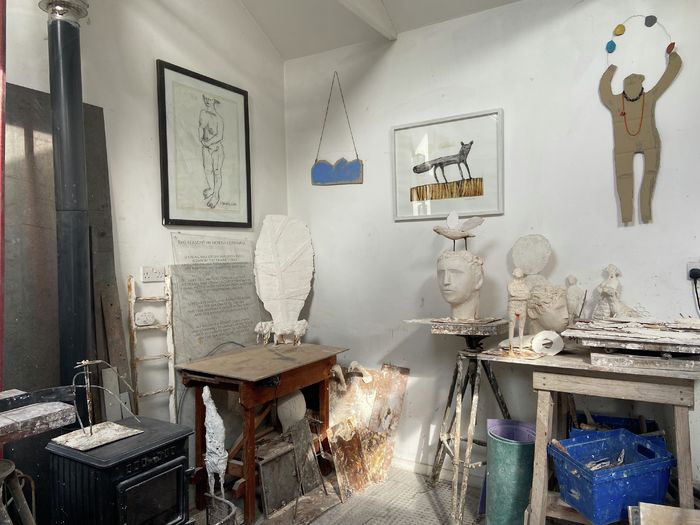Poetry and impersonal forces
Why does academic writing become detached while poetry is reserved for moments of intimacy? Anna Wythe ponders the divide between the personal and impersonal in writing her dissertation.

A dissertation has a way of becoming personal. It is a possession. You drag it around in tote bags till it breaks the skin on your shoulder. It joins the ranks of childhood pets and favourite albums as the data of small talk. As months go by, it permeates the body as exhaustion, restlessness, guilt. Is it so strange then, that the academic essay, with its clinical arrangement of evidence, starts to feel inadequate? The words I read each day have taken on a poetic quality: anthracite, petroleum, railroad. The world of industry, capital and labour relations may have seemed unliterary at first glance, but this distinction bothered me. Why should I associate those things with the impersonality of academic writing? Why was poetry reserved for small moments of intimacy?
The line between the personal and the impersonal is subtle but powerful. After all, the seething mass of the world has nothing to do with us. We have an intimate world, a kitchen table with sunflowers, and in it we keep our authentic selves. This space is chosen, or at least decorated to reflect our personalities. The people we invite into it are those with whom we can ‘be ourselves’. Beyond there is only machinery, paperwork and starlight. That, at least, is the myth.
“We have an intimate world, a kitchen table with sunflowers, and in it we keep our authentic selves”
Poetry often shares this idea of a special, hyper-charged realm. The process of choosing images for poetry is essentially mystical, as tiny fragments of sense data are given a personal, even religious, meaning. Yet, Emerson writes that the great poet “re-attaches things to nature and the Whole, — re-attaching even artificial things and violations of nature, to nature, by a deeper insight.” For him, the mysticism lies in incorporating even the most mundane symbols, “the factory village and the railway,” into a greater divine harmony, or at least into the logic of a poem.
Emerson’s friend, Walt Whitman, took up this great challenge. Whitman had cropped up a few times in my reading on late-nineteenth century America, so when I came to his work I initially thought of it more in terms of evidence than lyricism. Yet, like a roving camera, Whitman moves readily from agriculture, from enormous technological innovations, to moments of intense personal intimacy. I found myself forgetting my analytic purpose, and instead moving through his world as though my hands were parting foliage to look into each scene. He writes, “In me the caresser of life wherever moving, … not a person or object missing, / Absorbing all to myself and for this song.” The poet is the great encompassing force that moves among all things, seeing and loving them, making personal the indifferent data of the world.
“A statistic is not uncanny, but it is uncanny to find ourselves and those whom we love as statistics”
I spent hours poring over railroad charters of incorporation, but through Whitman I could feel the “black cylindric body” and “beat convulsive” of the locomotive. Still, I would struggle to feel about algorithms, or some modern embodiment of impersonal forces, the way that Whitman felt about trains. Even in the ways that they are part of my life, they feel alien. I know that my actions are filtered through institutions and bureaucracy but the internal tension these things provoke feels important. I wouldn’t want to accept it all as part of a greater harmony. At the same time, the personal relation that poetry allows to impersonal forces seems crucial. A statistic is not uncanny, but it is uncanny to find ourselves and those whom we love as statistics.
“America, your machinery is too much for me.” In Alan Ginsberg’s poem America, the poet’s mind ranges among history and politics, alongside everyday pain and desire. The line, “America I feel sentimental about the Wobblies,” refers to the International Workers of the World, a labour organisation that was brutally suppressed for its radicalism at the beginning of the twentieth century. Ginsberg’s admission of this subjective connection to history opens up a dynamic relation between the intimate self and the world it strives to encompass. He writes, “It occurs to me that I am America. I’m talking to myself again,” but there is something ironic, even schizophrenic, in these lines that distinguishes Ginsberg’s expansiveness from that of Walt Whitman.
As I sit at a bus stop in small town America, and fail to write my dissertation, I think of different forms it could take: a poem, a love letter, a collage, an essay. I don’t doubt the significance of painstaking archival work, or careful weighing of evidence, but I want the other forms as well. The impersonality of academic writing can show you the world, but it cannot show you your place within it. We also need ways of writing that break the artificial divide between what is personal and impersonal in the world.
 Features / How sweet is the en-suite deal?13 January 2026
Features / How sweet is the en-suite deal?13 January 2026 Comment / Will the town and gown divide ever truly be resolved?12 January 2026
Comment / Will the town and gown divide ever truly be resolved?12 January 2026 News / 20 vet organisations sign letter backing Cam vet course13 January 2026
News / 20 vet organisations sign letter backing Cam vet course13 January 2026 Arts / Fact-checking R.F. Kuang’s Katabasis13 January 2026
Arts / Fact-checking R.F. Kuang’s Katabasis13 January 2026 Music / Inside Radiohead’s circle13 January 2026
Music / Inside Radiohead’s circle13 January 2026









